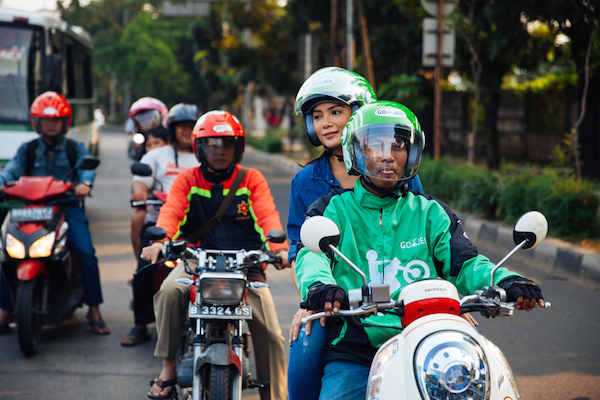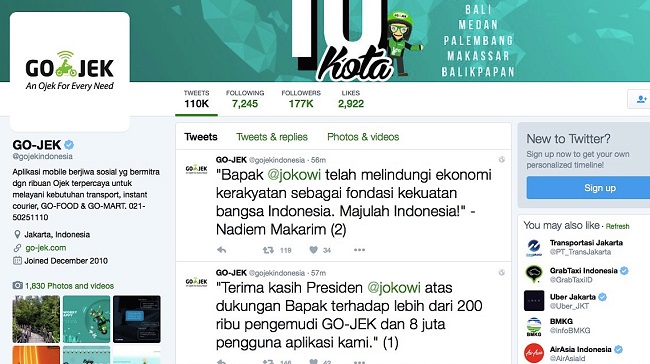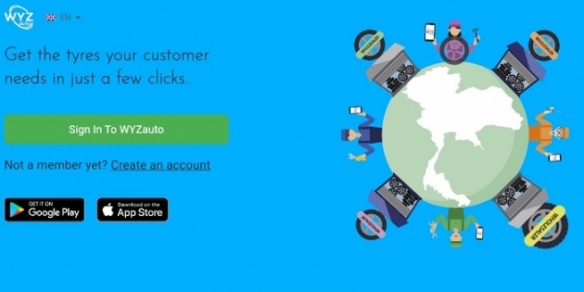Indonesia lifts ride-sharing ban in quick ‘u-turn’
By Masyitha Baziad December 18, 2015
- Transportation Ministry reverses ban barely 24 hours after first announcing it
- President Jokowi was against ban, says regulations should support not restrain

Untuk membaca berita ini dalam Bahasa Indonesia, silahkan klik di sini
BARELY 24 hours after it imposed a ban on motorcycle taxis and ride-sharing apps, Indonesia’s Transportation Ministry reversed its decision, possibly in the wake of objections from the country’s own president, and consumers being up in arms.
The ministry had issued a ban on the popular ‘motorcycle taxis’ known as ojek from operating in Jakarta and other major cities in Indonesia, as well as banning ride-sharing apps such as GoJek (pic above), GrabBike (operated by Singapore-headquartered GrabTaxi), Blue-Jek and Lady-Jek.
“Following the rise in the number of motor vehicles that are not official public transportation carrying people and goods based on Internet applications, we have taken action to prohibit them,” the ministry’s general director of land transportation Djoko Sasono told a press conference on Dec 17, according to The Jakarta Post.
The ban came after Transportation Minister Ignasius Jonan signed an official letter dated Nov 9, 2015, saying that ojek and reservation apps do not meet the requirements of a 2009 law on traffic and public transport.
The law says that in order to provide public transport, a vehicle needs to be three-wheeled or more, have a legal entity behind it, and have a legal operating permit.
However, the ministry today (Dec 18) made a quick u-turn and lifted its shortlived ban.
In an official statement, Ignasius said that while the 2009 law does not allow two-wheeled vehicles to operate as public transport, “the reality … is that there is a huge gap between the need of reliable public transportation and the ability of the Government to offer such service.
“That gap has been filled by ojek for so long already, and also by app-based online reservation services such as GoJek and others.
“Based on that, ojek and other public transportation used by app reservation services are now allowed to operate … until safe and reliable public transportation can be offered by the Government,” he said.
On the issue of safety requirements, Ignasius urged ojek operators to discuss the matter with Indonesian police’s Traffic Management Coordinator.
The u-turn came after social media networks and blogs in the country erupted with objections and criticisms from consumers.
And it was not just the people of Indonesia who had expressed their displeasure: President Joko ‘Jokowi’ Widodo himself went on Twitter to object.
Via his personal official Twitter account @jokowi, he told his followers that he is going to call on Ignasius, the minister, to explain the rationale behind the ban.
“I am going to call the Minister of Transportation. Our people need ojek. Do not make the people suffer from regulations. It [ride-sharing] should be managed – Jkw,” he wrote.

On his official Facebook account, Jokowi reiterated his message, adding that there was a need to support innovations stemming from the younger generation.
“Regulations should not curb innovation … that comes from our own young, creative people. We need to manage the innovation, while accelerating improvements in public transport.
“The most important thing is to embrace, to govern, and to manage – not prohibit,” he wrote.
When contacted by Digital News Asia (DNA), the president’s communications team said that Jokowi supports ojek operations as well as the digital innovation coming from ride-sharing startups.
“We need to remember that ojek exists because the people need it. We need the transportation agency and ministry to support them and at the same time regulate them, to make sure that they follow the safety requirements needed,” Jokowi said in a statement.
Meanwhile Kiki Rizki, country marketing head of GrabBike Indonesia, said the company would respect any regulation from Indonesian authorities.
Saying that this was a young industry in Indonesia, “we will keep cooperating with the Government and stakeholders in order to expand the current legal landscape.
“We believe that creating public transport solutions which are safe and reliable, as GrabBike has been doing, will benefit the people of Indonesia the most,” she said in an official statement.
GoJek has not issued any statement on the issue, and DNA’s attempts to contact the company have not succeeded as at press time.
However, on GoJek’s official Twitter account @gojekindonesia, founder Nadiem Makarim expressed his appreciation for the President’s response to the ban, saying that Jokowi was expressing support for not just consumers, but also the more than 200,000 ojek drivers GoJek employs.

Enforcement won’t be effective
The ban had come in the wake of the Jakarta Transportation Agency saying in September that it was “keeping an eye” on ride-sharing services such as those offered by US-based Uber Technologies and GrabTaxi.
Meanwhile, the Indonesian Consumer Organisation (YLKI) said that such a ban would not have been effective anyway, since it was already “too late.”
“People in this country have been using ojek services for so long, and reservation apps just made it easier and more convenient.
“This has already become part of society,” YLKI said in an official statement to DNA earlier today (Dec 18).
YLKI also argued that enforcement of this ban, it if had gone through, just would not be effective, as with the enforcement of most of Indonesia’s traffic regulations – it would have been only be a formality, rather than a “real ban.”
“The Transportation Ministry can never effectively ban the existence of ojek nor the tech startups that are innovating around reservation apps, simply because the Government itself has not created any solution for good and affordable public transportation,” it said in its statement.
Related Stories:
Jakarta task force keeping an eye on Uber … and GrabCar
GrabCar fully legalised as a transport company in the Philippines
Singapore regulates taxi apps, GrabTaxi and Uber respond
Uber lauds Manila regulations for legalising ride-sharing apps
Bread & Kaya: Uber and GrabCar services legal in Malaysia?
For more technology news and the latest updates, follow us on Twitter, LinkedIn or Like us on Facebook.


